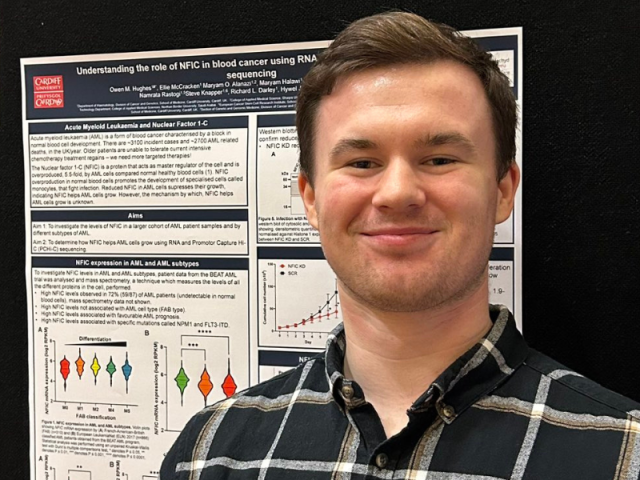
Next generation of researchers are discovering new pathways to target blood cancer
22 April
Blood cancer is the fifth-most common cancer in the UK, but its many variations have historically made it notoriously difficult to treat. There are over 100 different types of Acute Myeloid Leukaemia (AML), each caused by a different mutation.
As part of his PhD, Owen Hughes is investigating how a protein called NFIC (Nuclear Factor I/C) influences the growth of acute myeloid leukaemia (AML) cells. NFIC is a protein that acts as a transcription factor, meaning it controls the activity of other genes by binding to DNA. Owen said:
“We already knew that AML cells produce more NFIC than normal cells but until recently, it wasn’t clear why.”
Owen created AML cells that make less NFIC and compared their behaviour to standard AML cells. His results showed cells with less NFIC grew more slowly suggesting this protein plays a key role in helping the cancer spread.
As Owen enters the final stages of his PhD, he is focused on validating this outcome. If successful, this could become new way of targeting the disease and open doors to better treatments for AML in the future.
Owen said:
I’m really excited to build on these findings and hopefully make a difference to how we treat this disease.”
Professor Alex Tonks, of the Division of Cancer and Genetics at Cardiff University, is supporting Owen’s research into a “precision” treatment for AML, thanks to the funding by the Health and Care Research Wales Faculty.
Professor Tonks said:
“I’m passionate about supporting early career researchers and teaching the next generation of scientists that will take this research forward and generate those treatments for those patients.”
To keep up to date with news about the Faculty and Health and Care Research Wales funding, sign up to the Health and Care Research Wales weekly bulletin.
If you have any questions regarding the Health and Care Research Wales Faculty, email the Faculty team.